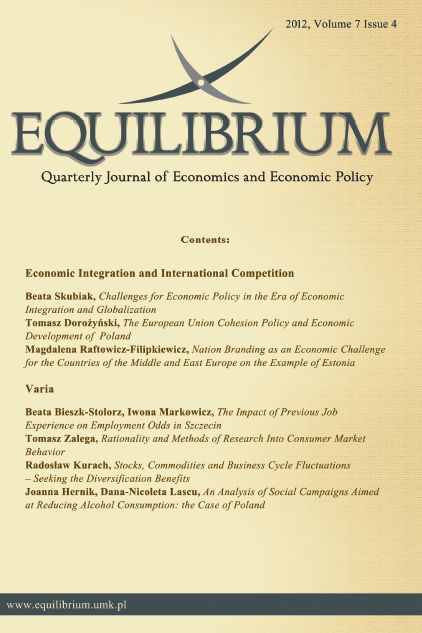Nation Branding as an Economic Challenge for the Countries of the Middle and Eeast Europe on the Example of Estonia
DOI:
https://doi.org/10.12775/EQUIL.2012.026Keywords
national branding, macro-competitiveness, EstoniaAbstract
This paper presents the topic of nation branding, which is considered as a complementary factor of the traditional economic policy implemented in a given country. The concept of branding aims at creating a strong national brand for improving the brands of national products, as well as the image of the country which influences the attraction of foreign direct investments and increase the export. The example of Estonia attempts to prove that the actions for national brand changed positively the image in this country, as well as the competitiveness of the economy. For this purpose the author used the ranking of national brand and international competitiveness. The author also set as a goal to recognize if the concept of nation branding can be useful for the other countries of Central and Eastern Europe, especially Poland. The conclusion of this paper is that nation branding is an economic challenge for these countries and should be implemented as soon as possible in their strategies of country’s development.References
Altkorn J. (1999), Strategia marki, PWE, Warszawa.
Anholt-GfK Roper Nation Brand Index, www.image schweiz.ch/.../Switzerland_2009_NBI_Report_08-31-2009.pdf
Anholt-GfK Roper Nation Brand Index, www.nation-branding.info/2008/10/01/anholts-nation-brand-index-2008-released/2008-9
Country Brand Index, www.futurebrand.com/wp-content/.../CBI_BBC_2010_ execsummary.pdf
Daszkiewicz M., Waniowski P., (2006), Marka narodowa w kreowaniu wizerunku produktów, [in:] J. Kall, B. Sojkin (ed.), Zarządzanie produktem – wyzwania przyszłości, AE w Poznaniu, Poznań.
Dinnie K. (2008), Nation branding, concepts, issues, practice, Elsevier, Oxford.
Han M.C. (1989), Country Image: Halo or Summary Construct, “Journal of Marketing Research”, No. 5.
Ketels Ch. (2006), The Baltic Tigers – An end in sight for the growth story?, Baltic Rim Economies, “Bimonthly Review”, No. 31/10.
Nebenzahl I. D., Jaffe E. D., (1996), Measuring the joint effect of brand and country image in consumer evaluation of global products, “International Marketing Review”, Vol. 13., Issue 4.
Olins W. (2004), Wally Olins o marce, Instytut Marki Polskiej, Warszawa.
Paquet G. (1999) Approche conceptuelle de l’image d’un pays, Raport de l’image de la Belgique, Bruxelles.
Schooler R., Wildt A. (1968), Elasticity of Product Bias, “Journal of Marketing Research”, No. 5. Statistics Estonia, www.stat.ee (10.03.2011).
Styś A., Styś S. (2004), Marketing jako orientacja kierownicza, [in:] L. Garbarski (ed.), Kontrowersje wokół marketingu w Polsce, tożsamość, etyka, przyszłość, Wyższa Szkoła Przedsiębiorczości i Zarządzania im. Leona Koźmińskiego w Warszawie, Warszawa.
World Economic Forum, Global Competitiveness Report 2005-2006, www.weforum.org/site/homepublic.nsf/Content/Growth+Competitiveness+Index+rankings+2006+and+2005+comparisons (10.03.2011).
World Economic Forum, Global Competitiveness Report 2007-2008, www.members.weforum.org/pdf/Global_Competitiveness_Reports/Reports/gcr_2007/gcr2007_rankings.pdf (10.03.2011).
World Economic Forum, Global Competitiveness Report 2010-2011, www3.weforum.org/docs/WEF_GlobalCompetitivenessReport_2010-11.pdf(10.03.2011).
www.visitestonia.com(10.03.2011).
Downloads
Published
How to Cite
Issue
Section
Stats
Number of views and downloads: 306
Number of citations: 0



